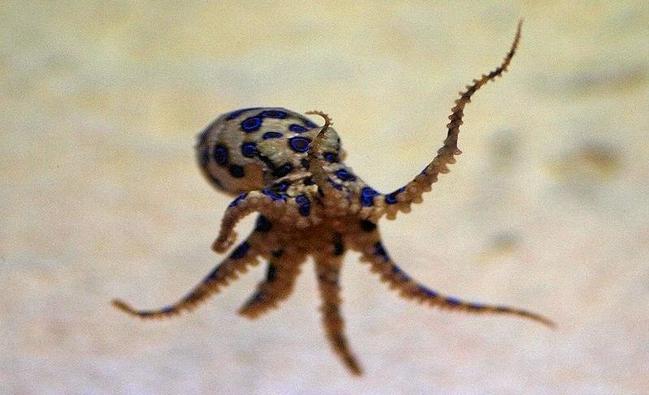BEACH DANGERS: Octopus, 'flesh-eating' bacteria, jellyfish
NOT all of the nasties lurking in the water at this time of year have savage teeth, writes our fishing columnist.

Lismore
Don't miss out on the headlines from Lismore. Followed categories will be added to My News.
PLENTY of dangers lurk in the water at this time of year and they're not all armed with savage teeth.
The Northern Star newspaper ran a front-page story a while back about a person who almost had to have their leg amputated after a water-borne organism infected a wound.
Infections from marine organisms are far more common than you'd think, especially at this time of year.
The most prevalent of the "flesh-eating" bacteria is Vibrio vulnificus, closely related to the cholera bacillus. It's very wide-ranging in inshore and estuarine waters and can cause severe food poisoning if ingested on raw shellfish, for instance.
Infection through an open wound when swimming or wading can result in rapid and severe tissue destruction if the patient has impaired liver function, other chronic diseases or reduced immune response, such as the person in the recent story.
But infection of some sort or another is often the case with cuts and scratches received when fishing, especially in tropical-style water.
One of the best solutions is to dab a little metho or isopropyl alcohol on these misadventures as soon as you get home. Antibiotic cream is even better, especially up north for coral scratches, which always seem to go septic otherwise.
As if that wasn't enough, there have been quite a few reports from not far over the border about sightings of irukandji jellyfish, with Hervey Bay sightings becoming more common.
I know there are a lot of lookalikes, but I can recall seeing a few box jellies of some description in local rivers at this time of year back in my youth, so it isn't a big call to keep an eye out locally.
Of course, blue-ring octopus are widespread in this area but because of their retiring nature, they don't figure prominently on the local danger list.
Just remember, they're small and they're pale brown until they get amped up and start showing their vivid rings.
And they'll take a small lure worked slowly.
Some years ago a mate was about to flick off a blob of weed that had hung up on his tiny bream soft plastic. When he looked a bit closer in the pre-dawn light - you guessed it...
While we're on lure-takers, I once caught a stonefish about 30cm long on the Gold Coast Broadwater. I didn't try to get the jig head out of its mouth and just cut the line.
A couple of years ago I saw a dead one washed up on the beach at Evans Head after a flood, so tread carefully when wading!
And as someone who has trod on a stingray in the surf and felt the pain, I can't recommend that, either.
Not long now...
WORK on removing all parts of the old highway bridge over Emigrant Creek looks like being completed within a couple of weeks.
That will allow the reopening of the creek to boat traffic.
One can only imagine the number of crab traps that will go into this waterway in the days after it's open again...
"Environmental bastardry"
HOT on the tails of carp and tilapia comes another imported fish pest that could change the whole dynamics of freshwater ecosystems.
Central Queensland fishos are up on arms about the release of a highly predatory South American fish that could wipe out local species in only a couple of years.
Mackay Area Fish Stocking Association founding chairman Keith Day says the peacock bass, caught at the Dumbleton Weir on the Pioneer River last week, was almost certainly deliberately released from a private aquarium.
Mr Day says the aggressive peacocks could decimate stocks of the 2.5 million barramundi and sooty grunter his organisation has released in the river over the past 25 years.
"I can just see everything that we have worked for going down the gurgler," AAP quoted him as saying.
"Why anybody would think it was a good idea is beyond me - it's an act of environmental bastardry."
Native to the Amazon Basin, peacock bass are highly regarded as sportfish and their vivid colours have made them popular aquarium fish.
However, few measures can protect native fish once peacock bass have been introduced into a waterway.
In Panama they eliminated seven out of 11 previously common fish species in a number of waterways and significantly reduced three other species.
In Brazil's Rosana Reservoir and upper Paraná River, peacocks resulted in a 95% decline in native fish density and 80% decline in richness in only two years.
"They are a high order apex predator; they will eat anything they can fit in their mouth," said Catchment Solutions fisheries biologist Matt Moore.
"This has the potential to affect commercial, recreational and indigenous fish stocks.
"We then need to eradicate them as quickly as possible," he said.


